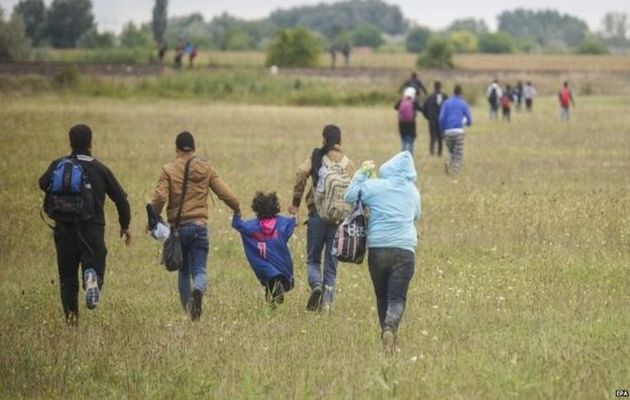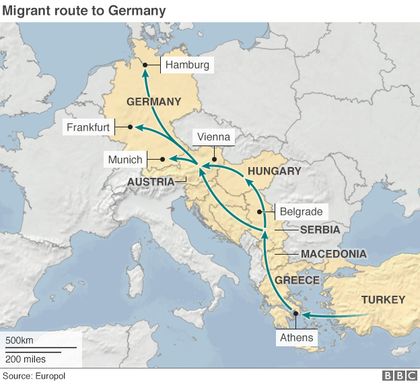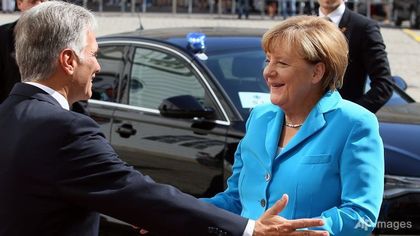Tackling the migration crisis in Europe
Migration issues have dominated a summit in Vienna, amid the worst refugee crisis in Europe since WWII. At least 20 migrants have been found dead in a lorry in Austria.
BBC, Agencies · VIENA · 27 AUGUST 2015 · 14:00 CET

German Chancellor Angela Merkel and Balkan leaders gathered in Vienna this Thursday to seek how to tackle together the biggest migration crisis to hit Europe since World War II.
The talks come a day after Merkel vowed zero tolerance for "vile" anti-migrant violence in Germany, and amid growing criticism of the European Union's failure to agree a joint response.
Migrants have continued to travel to Europe via the Central Mediterranean route, and the bodies of at least 50 people were found on Wednesday in the hold of a stricken ship off the coast of Libya.
Countries taking part include Macedonia and Serbia, two major transit nations for the thousands of migrants and refugees trying to enter the EU by taking the so-called "western Balkans route".
The foreign ministers of both countries called for a concerted EU action plan at the start of the summit.
"Unless we have a European answer to this crisis... no one should be under any illusion that this will be solved," Macedonia's Nikola Poposki said.
Meanwhile EU member state Hungary, which is a member of the EU's passport-free Schengen zone and has become the bloc's main entry point for migrants arriving by land along the Balkans route, was not attending the meeting.

The daily number of people crossing into Hungary hit a new high on Wednesday, topping 3,000, including nearly 700 children, police figures showed. Hungarian lawmakers will debate next week whether to deploy troops to stem the influx.
Alarmed by the growing humanitarian disaster, United Nations chief Ban Ki-moon has urged countries "in Europe and elsewhere to prove their compassion and do much more to bring an end to the crisis".
UN refugee chief Antonio Guterres and French Interior Minister Bernard Cazeneuve meanwhile have called for the urgent creation of more so-called "hotspots" - processing centres to sort refugees fleeing war, from economic migrants simply in search of a better life.
Originally meant to focus on EU enlargement, the Balkans summit in Vienna has been hijacked by what organisers have described as "the migrant challenge".
Ahead of the conference, Austria's Foreign Minister Sebastian Kurz warned that his country would consider introducing tougher anti-migration measures including "much tighter border controls", if the EU failed to come up with a unified response.
"Austria has more migrants than Italy and Greece combined ... so we shouldn't pretend that only Italy and Greece are affected," he said in an interview with public broadcaster ORF.
Meanwhile Germany, which is preparing to receive a record 800,000 asylum-seekers this year, has eased the asylum application procedure for Syrians fleeing the country's brutal civil war.

On her visit to a migrant shelter in the eastern town of Heidenau Wednesday, Merkel was greeted by about 200 protesters, some booing and shouting "traitor, traitor".
But the German leader, who continues to enjoy strong public support, vowed: "There will be no tolerance of those who question the dignity of other people."
AT LEAST 20 FOUND DEAD IN AUSTRIA
The Austrian authorities say at least 20 migrants have been found dead in a lorry in the eastern province of Burgenland.
The find is reported to have been made on a main road close to the border with Hungary.
Austrian police said there appeared to be 20 to 50 bodies in the lorry, judging by its size. They described the deaths as a horrible crime.
The vehicle had been since Wednesday but was not found until early Thursday.
Austria's Interior Minister Johanna Mikl-Leitner told a news conference it was a "dark day" and that their thoughts were with the victims and their families.
Published in: Evangelical Focus - europe - Tackling the migration crisis in Europe
